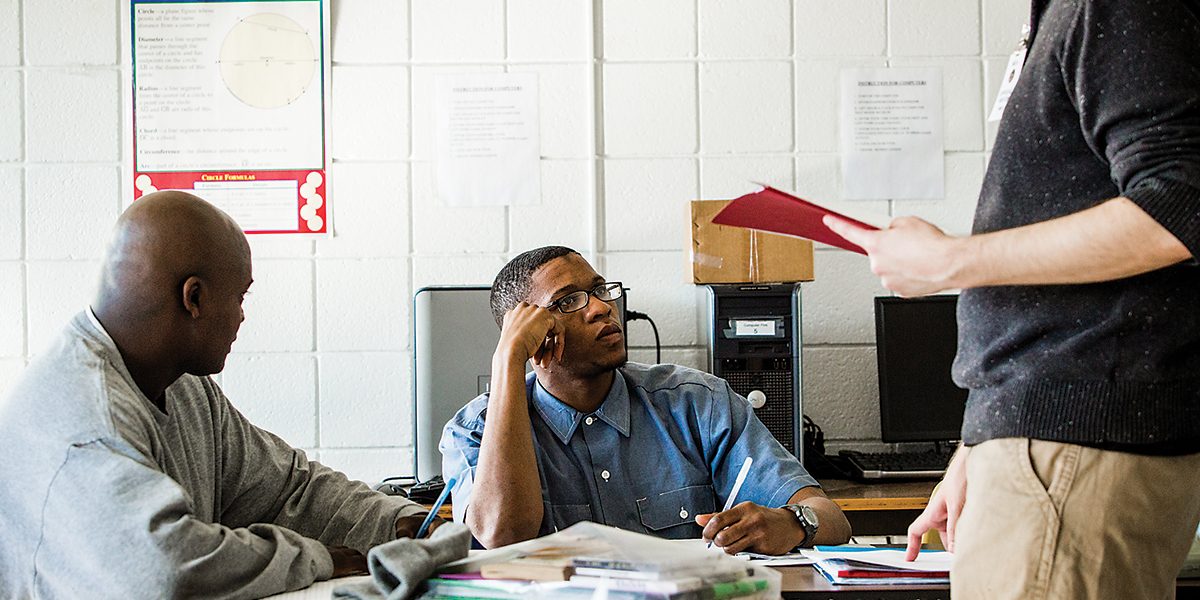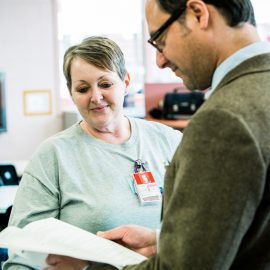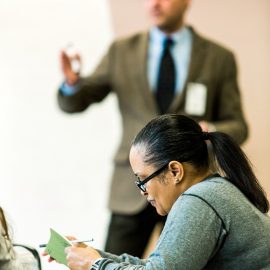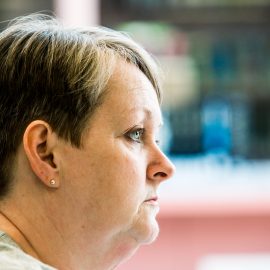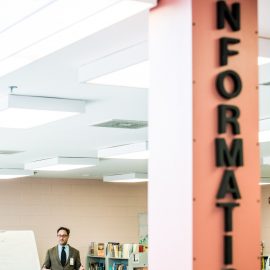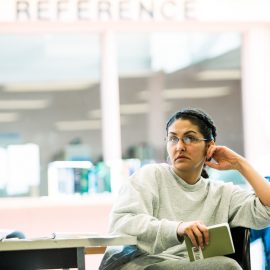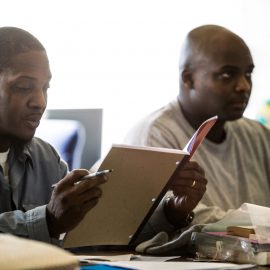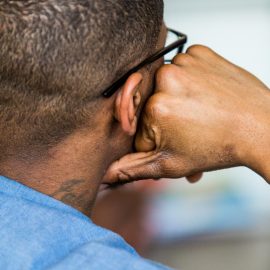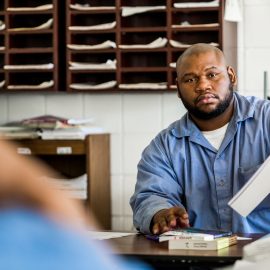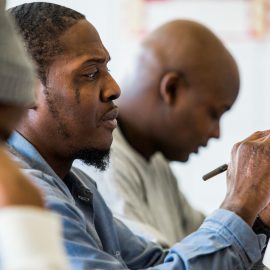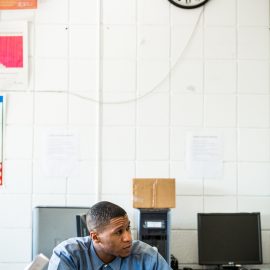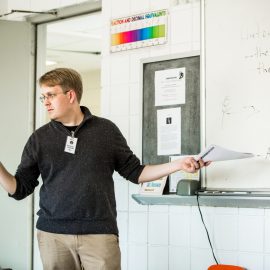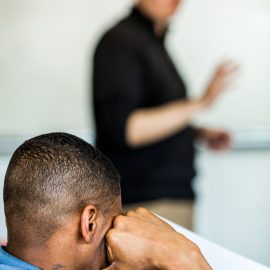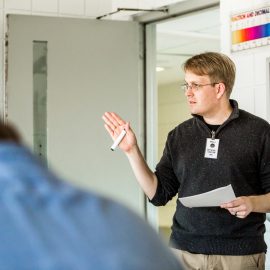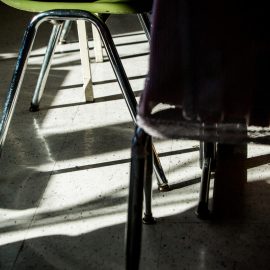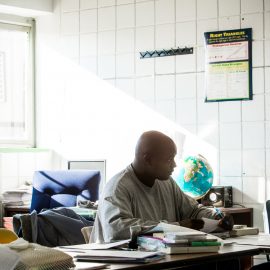News & Community
Lessons Learned
Goucher College brings its faculty, students, and courses into Maryland prisons.
As the clock approaches 3 p.m., dozens of students begin pouring into the sun-filled library on campus. Eventually, they fill up six round tables and each student pulls out a Hebrew scripture textbook peppered with Post-it notes. Professor Jerome Copulsky—dressed the part in black-rimmed glasses and a tweed blazer—stands at the front of the room, writing notes on an easel. A giant banner above him reads, “Welcome to Goucher College.” “Those of you doing rewrites, they are due to me next week,” Copulsky says to gain the attention of the class. “Two weeks from today, we’ll have your midterm exam.”
A smattering of nervous giggles fills the room.
“Yes, two weeks from today,” he reiterates. “I’ll be in study hall this coming Monday if you have any questions or things to work on.”
What follows is an engaging two-hour-long discussion of the book of Joshua, King Saul, and divinely ordained monarchy.
It’s a scene that could unfold in a lecture hall at any liberal-arts college around the country, but these students happen to be wearing denim jackets with the acronym “DOC” on the back—and are all inmates at the Maryland Correctional Institution for Women (MCIW).
This class is a part of the Goucher Prison Education Partnership (GPEP), which is a rare program that offers courses for credit inside prisons. The classes are taught by the same faculty and with the same syllabus as Goucher’s main campus to inmates at both MCIW and Maryland Correctional Institution–Jessup (MCIJ), the men’s prison.
“Many students in prison have never had access to high-quality education,” says program director Amy Roza. “Our professors maintain the same standards as they do on our Towson campus. We never want to stigmatize our students.”
Currently, there are 50 students enrolled at the two prisons, and, while they are earning college credit, they are non-degree candidates.
Many students take classes (and meet with Goucher student-tutors) five days a week, and, in 2012, the retention rate was 88 percent—compared to 69 percent at the average liberal-arts college.
“We’ve had college programs come and go,” says the MCIW warden Margaret Chippendale. “But the true difference with the Goucher program is that the ladies are working toward something. The idea is they will leave here and get a degree.”
While Goucher has been involved with detention centers and prisons as far back as 2005, the school began offering courses for credit when it received a grant in 2012. Roza, who has taught women at Rikers Island and once directed a 300-student program at San Quentin, was brought on to lead the program in the spring of 2012.
“I started seeing fliers posted around,” says Nicole Munshower, 24, who was incarcerated at MCIW for two years for possession of a controlled dangerous substance and a firearm, but was released in March of 2013. “I always wanted to take college classes, but with all the trouble I had gotten in, I didn’t think it would happen.”
The prison process parallels the regular application process. Inmates must have a GED or high school diploma, and then they go through information sessions, interviews, written applications, and placement exams. Goucher staff then determines whether the student is ready for college or their college-prep courses.
“We ask the same questions: ‘Is a person in a place where they are ready to commit? Are they motivated enough to face challenges?’” Roza says. “We look at academic readiness.”
Private grants and donations (about $250,000/year) allow for only 50 students a semester, but Roza says she has received hundreds of letters from inmates from these prisons and others expressing interest in applying.
The idea is particularly timely, as earlier this year New York Governor Andrew Cuomo announced a plan—met with much controversy—to provide public financing for basic college-education programs in state prisons. The plan is inspired by the work at Bard College’s Prison Initiative, a sister program of GPEP.
“These kinds of programs build self-esteem,” says Warden Chippendale. “And for so many of these ladies, they had no idea they could do anything; they felt worthless.”
In fact, the concept of taking college courses—Goucher offers everything from Latin American history and Understanding Politics to algebra and English 101—is far-fetched for a lot of the incarcerated students, many of whom grew up with limited financial means.
“I never thought I’d take a college class, as a matter of fact,” says 49-year-old West Baltimore native Denise Dodson who was charged with conspiracy and attempted murder. “I dropped out in 11th grade after getting pregnant with my son, so it was always just a dream for me.”
Now she’s getting A’s and B’s in her classes and developing skills she’d always lacked.
“It’s a struggle for me to keep those grades, but I do it because I want it so bad,” she says. “The difference for me has been night and day. Now, conversations are easier because I have a lot more to talk about.”
And it’s not only the students who are benefiting from the program. The professors have also been inspired by the inmates’ passion and acumen.
“They’re not only engaged and curious, but they’ve also turned out to be quite sensitive readers,” Copulsky says. “They know this is an opportunity afforded to them, so they have an absolute hunger for learning. In class, we end up have intellectual conversations, the kind that led me to want to be a professor in the first place.”
One of those very conversations is taking place just down Jessup’s route 175 in the men’s correctional facility, where nine students sit around a U-shaped desk as another professor, Chris Hazlett, teaches an English 104 class.
They are breaking down Martin Luther King Jr.’s lengthy “Letter from the Birmingham Jail,” as Hazlett defines terms like “didactic,” instructs students to underline passages, and asks what effect this sort of persuasive argument may have on an audience.
“Chris is a very good teacher,” says Maurice Smith, 42, a Harlem, NY, native who is serving 40 years for a murder conviction. “Before I came into his class, I thought I was a decent writer. But he’s broken me down and has been building me back up again.”
Smith said that, before he got transferred to Jessup, he was taking college courses at the Eastern Correctional Institution in Westover, but finds the curriculum at Goucher much more invigorating.
“I don’t want to be coddled,” he says. “This Goucher program holds you to higher standards. We are constantly writing papers, which help me formulate my thoughts and get my arguments to make sense. Right now, I am able to communicate with you in a more effective manner, not just on a street level.”
Both Smith and Dodson say they do their paper writing in the computer lab, but one of the main differences between college life here and on a traditional campus is the lack of an Internet connection.
“We are very low-tech here,” Copulsky says. “That makes certain things kind of tricky. But, in some ways, it makes learning easier, since there are fewer distractions.”
Roza explains that all communication—including mid-term and final grades, tutoring, and professor questions—has to be done in person rather than e-mail. And there are other limitations to teaching on a non-traditional campus, as well.
“It’s not the kind of place where you can just open the doors and say, ‘Go to school!’” says Chippendale. “Sometimes, count is going on or we’re dealing with meals, or there might be an investigation underway in the housing unit. It’s a different environment, and sometimes we just have to make due.”
Roza credits the staff and correctional officers at both prisons for making the melding of these two worlds possible.
“Prisons have a very specific culture, and academia has a very specific culture,” she says. “So it takes the staff to make that cultural exchange happen every day.”
Of course, one of the biggest cultural adjustments takes place once inmates get released and try to apply what they have learned in the real world.
“With my classes, I have started to see the things that my community is missing,” Smith says. “Sitting in here, I realize that I play a destructive part in that. Now that Goucher has given me something, I want to give something back when I get out—with social work or mentoring kids.”
Similarly, Dodson says her Understanding Politics class has given her a better idea of how society really works.
“I love it because I’m learning a lot of stuff that I didn’t know existed—like the media control and things like that,” she says. “The type of politics I’d like to go into is more like community organization.”
Of course, the road after release is not always that easy. Roza says that she has had about six students be released since the program started. Some want to pursue art school and some, like Munshower, have found a few hurdles along the way.
“It took me six months to find a job because I have a criminal record,” she says. “But, without a doubt, the college credits helped. A lot of jobs nowadays look for that and think you’re more responsible and have accomplished something.”
Right now, Munshower is working three jobs as a waitress, bartender, and deli worker and is looking to continue her schooling. An Anne Arundel Country resident, Munshower hopes to figure out transportation and take classes back on Goucher’s main campus. (Former inmates need to apply to a degree program to be accepted onto the Towson campus, but all of the credits they earned will transfer there or any other college.)
Eventually, she hopes to become a translator, but says a more pragmatic path would be majoring in business. Though she is no longer in prison, she still keeps in touch with Roza and her teachers from the program.
“They will not give up on you,” Munshower says. “School kept us girls out of trouble. We had a place where we could go—class or tutoring twice a day. We could escape the chaos and be in a room with people that wanted to get somewhere in life.”
